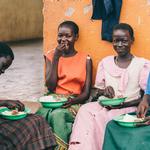Ten years after the end of its civil war, Angola, which is heading to the polls Friday, has been transformed into a regional African power with a strong economy, but poverty is still widespread.
Angola experienced double digit growth in GDP annually in the period 2002-2008. In the last five of these years, average annual growth was at 17%, which more than doubled the size of the economy. The country is the second largest oil producer in sub-Saharan Africa, and the third biggest economy, after South Africa and Nigeria.
Do these tremendous growth rates mean that Angola has escaped the so-called resource curse, where oil resources are detrimental to growth? Is Angola likely to continue growing at these fast rates, and perhaps catch up to the largest economies in the region in a few years' time? Is Angola a success in terms of development and poverty reduction?
It is not uncommon for countries that come out of a civil war to grow at very high rates. The growth seen in the period 2002-2008 may thus reflect the end of the civil war in 2002.
Read related: Post-war generation emerges as Angola votes
If there is a tendency to blame all that is wrong in Angola on its war legacy, perhaps the end of the war should be credited for things that have been going well?
It is always problematic to speculate about future growth rates. After 2009, growth has dropped to around 3% per year and projections for the coming years are in the range 5-8%. There are many reasons for this significant drop, the financial crisis and oil price development are part of the explanation.
But in the longer perspective, there may be more fundamental structural challenges to Angolan growth and development. In particular, research shows that resource-rich countries with little political accountability have trouble converting resources into development.
Angola scores still low on governance indicators, and the coming elections seem unlikely to challenge the over 30-year-long reign of President Jose Eduardo dos Santos.
Watch: Angola's economic potential
The fact the Angolan economy is the most concentrated in sub-Saharan Africa also makes growth vulnerable. The profitability of the oil sector renders diversification difficult in any economy.
But is the Angolan government really trying to diversify?
An important question is how government reliance on oil rents affects political incentives to diversify the economy. Business environment indicators for the country remain poor, while investment is hampered by a lack of education and institutional challenges.
Do the poor care about the overall growth rate of the Angolan economy? Experience shows that growth reduces poverty less in countries with high initial inequality. And oil-driven growth in a country with low political accountability is susceptible to wealth concentration rather than redistribution. Employment in the oil sector is typically also too limited to produce widespread economic opportunities.
Read also: Ghana's oil discovery: blessing or curse?
We really don't know too much about the situation of the poor in Angola today. The last real census in the country was conducted in 1970. The last figures on poverty are from 2000, putting the proportion of people living on less than $1.25 a day at 54%. Angola ranks as 148 out of 187 countries on the Human Development index.
Based on a household sample, INE estimated a poverty rate of 37% in 2008. However, it is difficult to assess how the poverty line was constructed. As data is not directly comparable to previous studies, it is also problematic to analyze development over time. In spite of this, the President claims that the poverty rate has been reduced from 70 to 37% from 2002 to 2008.
A census is due to be held next year. Interestingly, but perhaps not surprisingly, it takes place after the coming elections.
Some data of a more limited nature do provide a window onto the situation of the poor in Angola. In 2010, the Angolan NGO Development Workshop and the Chr. Michelsen Institute conducted a survey of microcredit clients in Luanda.
Results suggest that business profitability among the poor is constrained by a lack of education and health and by corruption. This indicates that the factors that restrain dynamism in non-oil segments of the Angolan economy, also act as constraints on the very survival of the urban poor.
Without structural and political reforms of these constraints, it is hard to believe that an election in and of itself will change the lives of the poor.
Read more:
http://edition.cnn.com/2012/08/30/opinion/opinion-angola-development-elections/index.html
http://edition.cnn.com/2012/08/30/opinion/opinion-angola-development-elections/index.html

Diversification of the Angolan economy
Jan 2011 - Dec 2014

Poverty and entrepreneurship
Jan 2011 - Dec 2014







